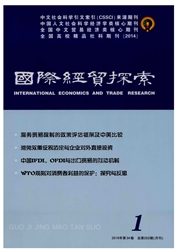

 中文摘要:
中文摘要:
文章在Antras、Levchenko和Acemoglu有关贸易比较优势的制度来源研究基础上.进一步探讨了制度比较优势的贸易来源,研究发现国际贸易对制度质量的影响存在“力争上游”、“甘居下游”和“左右逢源”三种效应:若贸易双方在依赖制度质量的商品技术差异极小.贸易会促使双方均改善其制度质量而“力争上游”(动态比较优势);若有一方有足够强的技术优势(斯密优势),其对方的国内制度质量很难改善甚至会恶化而“甘居下游”(比较优势陷阱):若一方没有足够强的技术优势(李嘉图优势),其对方的国内制度质量无需改善而“左右逢源”。
 英文摘要:
英文摘要:
This paper discusses trade sources of institutional comparative advantage based on Antras, Levchenko and Acemoglu's studies on institutional origins of comparative advantage in trade: It finds that international trade has three effects on institutional quality, which are "race to the top" effect, "stay in the downstream" effect and "best of both worlds" effect. If trading partners are in nearly the same level of technology, international trade will encourage both of them to improve the quality of their domestic institution to "race to the top" (dynamic comparative advantage); when one party has sufficiently strong technological advantages (Smith advantage) on the commodity dependent on institution, the domestic institutional quality of its counterparty is difficult to improve or even worsen to "stay in the downstream" (comparative advantage trap). If none is not sufficiently strong in technical superiority (Ricardian advantage), its trading partners' domestic institutional quality is not necessary to improve(gain advantage from both ways).
 同期刊论文项目
同期刊论文项目
 同项目期刊论文
同项目期刊论文
 期刊信息
期刊信息
